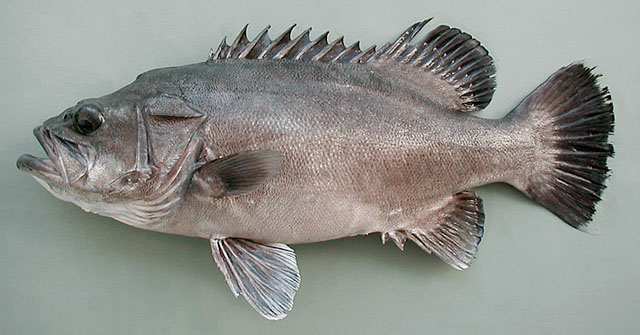| Polyprionidae (Wreckfishes) |
| 210 cm TL (male/unsexed); max.weight: 100 kg |
|
demersal; depth range 40 - 600 m, oceanodromous |
| Eastern Atlantic: Norway to South Africa (Ref. 6633), including the Mediterranean, Canary Islands, Madeira, Cape Verde, and Tristan da Cunha. Western Atlantic: Newfoundland, Canada and Gulf of Maine to North Carolina, USA (Ref. 7251). Recorded from Uruguay to Argentina (Ref. 9050). Western Indian Ocean: St. Paul and Amsterdam islands (Ref. 6633). Southwest Pacific: New Zealand (Ref. 5755, 9072). |
|
Dorsal spines (total): 10-12; Dorsal soft rays (total): 11-13; Anal spines: 3-3; Anal soft rays: 8-10. Bluish grey above, paler below with a silvery sheen; fins blackish brown (Ref. 6633). Juveniles have black blotches on head and body (Ref. 6633). Body tall, compressed. Big mouth with big head and a rough bony ridge across upper part of the gill cover (Ref. 35388). |
| Adults prefer to inhabit caves and shipwrecks (Ref. 27121). Juveniles congregate below floating objects (Ref. 27121). Usually solitary. Feed on large crustaceans, cephalopods and benthic fishes (Ref. 27121). Spawn in the summer (Ref. 35388). Are primary gonochorists (Ref. 58421). Marketed fresh or frozen; eaten steamed, fried, broiled, boiled, microwaved and baked (Ref. 9988). Minimum depth reported from Ref. 6633. |
|
Data deficient
(Ref. 96402)
, IUCN Grouper and Wrasse Specialist Group
|
| harmless |
|
Source and more info: www.fishbase.org. For personal, classroom, and other internal use only. Not for publication.
Page created by Jen, 05.08.02,
php script by kbanasihan 06/09/2010 ,
last modified by
dsantos, 20/08/10

